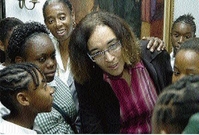
Suzanne Francis-Brown (centre) has a pep talk with students from St George's Girls Primary and Infant School after the Jamaica National Heritage Trust's (JNHT) monthly brown bag lunchtime discussion session on women in Jamaican history, at 79 Duke Street in Kingston last Tuesday. Executive director of JNHT, Laleta Davis-Mattis (background), looks on. - Rudolph Brown/Chief Photographer
The Jamaica National Heritage Trust (JNHT) on Tuesday, March 31, in its monthly brown bag lunchtime discussion session, recognised the fighting spirit of Jamaican women.
Guest speaker, historian Susan Francis-Brown, noted that the late Lucille Mathurin Mair (historian/ international civil servant), in her book In the Rebel Woman in the British West Indies during Slavery, discusses the methods used by enslaved people to express their resentment of the institution and slave holders.
Resentment expressed
Francis-Brown said that Mair, in her book, pointed out that these people expressed their resentment by seeking to establish that women "who are often regarded as the submissive sex also took an important part in forms of protest against slavery" - using some of the same techniques of defiance as men. These included running away, plotting and conspiring and fighting, as did Nanny of the Maroons.
They also used ways peculiar to women, such as childbearing periods to limit their workloads and to extract concessions from their masters.
Mair's book also pointed out that men and women were "equal under the whip", working in the field gangs while their strength allowed.
The unsung role
Francis-Brown also discussed the unsung role of women whose focus was to create community, family and carry with men aspects of culture, even in slavery. She said the role fell heavier on women because of the gender imbalance division of the labour (caregivers, training children from they were young to their positions as enslaved labourers, etc).
"The overwhelming responsibility of women was established in the persistent failure to name the fathers of the children born in slavery," said Francis-Brown.